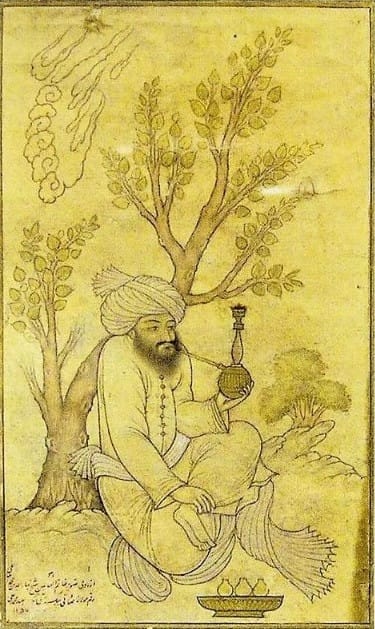
Bahāʾ al-dīn al-ʿĀmilī
Baha al-Din Muhammad ibn Husayn al-Amili (Arabic: بهاء الدين محمد بن حسين العاملي, romanized: Bahāʾ al‐Dīn Muḥammad bin Ḥusayn al‐ʿĀmilī; 18 February 1547 – 1 September 1621), also known as Bahāddīn ʿĀmilī, or just Sheikh Bahāʾi, was a Levantine Arab Shia Islamic scholar, poet, philosopher, architect, mathematician and astronomer, who lived in the late 16th and early 17th centuries in Safavid Iran. He was born in Baalbek, Ottoman Syria (present-day Lebanon) but immigrated in his childhood to Safavid Iran with the rest of his family. He was one of the earliest astronomers in the Islamic world to suggest the possibility of the Earth’s movement prior to the spread of the Copernican theory. He is considered one of the main co-founders of Isfahan School of Islamic Philosophy. In later years he became one of the teachers of Mulla Sadra.
He wrote over 100 treatises and books in different topics, in Arabic and Persian. A number of architectural and engineering designs are attributed to him, but none can be substantiated with sources. These may have included the Naqsh-e Jahan Square and Charbagh Avenue in Isfahan. He is buried in Imam Reza shrine in Mashad in Iran.
More Details
- Other Names :Baha al-Din al-Amili,Baha_ al-din al-_Amili,Bahauddin Amili,Bahaüddin Amilî,Bahāʾ al-dīn al-ʿĀmilī,Behaedîn Amilî,Cheikh Bahaï,Muḥammad Ibn-Ḥusain Bahāʾ-ad-Dīn al-ʿĀmilī,Sheikh Bahai,Şeyx Bəhaəddin Amili,Šejh Bahai,Ал-Амили,Баха-ад-дин аль-Амілі,Баҳоуддини Омилӣ,Шейх Бахаи,שייח' בהאי,الشيخ البهائى,الشيخ البهائي,بہاء الدین عاملی,شیخ بهایی,شیخ بہاء الدین عاملی,シェイク・バハエイ,巴哈丁·阿米里
- WikiPedia Page
- Country : Safavid Iran
- Born on 1 September